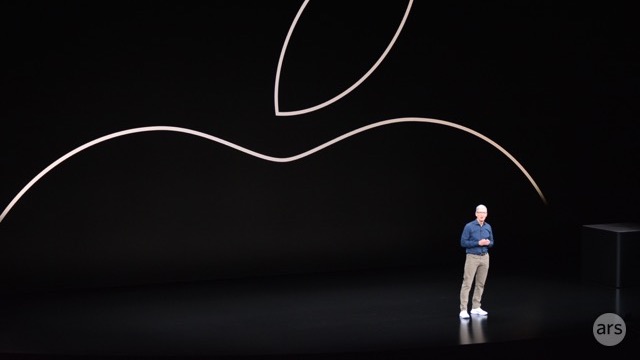
Tim Cook on stage during an Apple event in September 2018.
Software may come and go from the App Store, but this week marks a return that could have some real significance for Apple. OurPact, an app that lets parents monitor and limit their children’s use of technology, has returned to the App Store after being removed this spring. Its creators posted a social message to followers informing them of the app’s return to iOS earlier this week.
“A major thank you to our community for the outpouring of support throughout these removals,” the OurPact announcement reads. “Every tweet, share, and mention helped spread the word and restore the future of iOS digital parenting. We look forward to developing family screen time solutions for years to come!”
OurPact was one of 11 apps providing parental control over kids’ smartphone usage to be restricted or completely removed from the App Store in April. At the time, Apple claimed the move was due to privacy concerns. It argued that the apps in question used mobile device management (MDM) technology that could “[give] a third party control and access over a device and its most sensitive information, including user location, app use, email accounts, camera permissions, and browsing history.”
The apps impacted by the move claimed that Apple was just trying to reduce the competition for its Screen Time service, which was built in to iOS 12 when it launched late last year. OurPact’s blog post in response said that MDM does not allow it to see emails, calendars, contacts, SMS or iMessages, browser history, device location, or other critical information.
The issue may be one where both sides have some validity to their claims. Apple’s MDM platform has been the subject of exploits and malicious attacks in the past year. But this also isn’t the first time Apple has made moves that could be seen as limiting competition with its own internal services.
Below: Screenshots of Apple’s competing Screen Time app, from our iOS 12 review.
-
Screen Time has prime real estate in the Settings app, near notifications and do not disturb.
Samuel Axon -
It’s off by default, so you’ll first be asked to turn it on…
Samuel Axon -
Apple explains to the user exactly what the feature does.
Samuel Axon -
You’ll be asked whether you’re setting it up just for yourself, or for a child in your family.
Samuel Axon -
Pick family, and you’ll get more explanation and a prompt to add a child.
Samuel Axon -
Choosing the family route will prompt you to enter the Apple ID and password for the child you want to add.
Samuel Axon -
Regardless of which route you took, once Screen TIme is enabled, you’ll see this settings panel with the various features and customizations you can make.
Samuel Axon -
At the bottom, you’ll also find a few more settings like these.
Samuel Axon -
Here we’re digging deeper in the graphs.
Samuel Axon -
There are even more graphs.
Samuel Axon -
Tap into Downtime, and you’ll be able to set a time window during which only apps you’ve explicitly allowed will be accessible, across all your iCloud devices that support Screen Time.
Samuel Axon -
Going back to main settings menu and tapping App Limits brings you here, where you can start the process of establishing usage time limits for certain categories of apps. App Limits are off by default…
Samuel Axon -
You can choose which app categories to limit after enabling the feature.
Samuel Axon -
Here, you set the time limit and can make additional changes to which apps to limit.
Samuel Axon -
Another key feature, “Always Allowed,” can also be accessed from the main Screen Time settings menu. This is what you see if you tap it—a list of apps that are exempt from Downtime.
Samuel Axon -
The “Content & Privacy Restrictions” feature of Screen Time basically acts as traditional parental controls; you can limit which features a child can use or what content they can view.
Samuel Axon -
Some more settings in the top-level Content & Privacy Restrictions menu.
Samuel Axon -
Here, we’re customizing content and privacy restrictions for iTunes and App Store purchases.
Samuel Axon -
These are the settings for content like TV and music.
Samuel Axon -
You can also set a special passcode for Screen Time features.
Samuel Axon
Apple has faced similar criticisms before about the App Store. In the specific case of OurPact and screen time management, two of the apps filed an antitrust complaint with the European Union. The company has also tangled with Spotify, an independent streaming audio company that claimed it was treated unfairly to encourage listeners toward Apple Music. The EU has fielded other arguments that Apple should not offer its own services on the ecommerce platform it manages, and leadership in the bloc has proven willing to consider a strict stance against the major US tech companies.
Even some domestic leadership has been calling the relationship into question. Sen. Elizabeth Warren (D-Mass.) said that she would break up several tech giants if she is successful in her presidential bid in 2020.













